Earlier today, I posted my two cents about Ganzer’s book, Kneading Journalism, and now I have the opportunity to share this Q&A with the author. The note at the beginning was just something I included for him, but I enjoyed his response enough that I thought I’d throw it in.
There’s an intimidation factor I hadn’t anticipated in asking questions to 1. a journalist and 2. a journalist about a book on journalism. Hopefully this is worth your time 
I really appreciate you taking the time to read these essays and wanting to engage in dialogue. Hopefully the feelings of intimidation and hunger subside with some bread and good chatting!
Could you take a moment or two to introduce yourself to my readers? What set you on the path to writing this book, describe your path to publication, and so on?
For most of my career I have been a public media broadcaster, working for NPR stations in the US, and was previously a correspondent for an English-language service of the Swiss Broadcasting Corporation. I’ve been fortunate to have covered everything from tracing the Ricola production cycle from Alpine herb farm to cough drop, to the realities of Swiss gun culture. From the earliest experiences of “real world” journalism, though, I’ve been confronted with the juxtaposition of reality versus ideal. I wanted to tell sound-rich, character-filled stories all the time, but modern journalism is still very much a “feed the beast” apparatus all too often chasing minutiae and scandal. So more than 15 years ago I started writing short essays on my craft, and posting them on my website. I’d reflect on whether Glenn Beck being interviewed by Anderson Cooper on Glenn Beck’s show about Glenn Beck’s book was appropriate. Or I’d reflect on whether journalism as a craft is being practiced by other industries as a kind of “outsourcing” of journalism. These essays were part journal, part industry critique, and part lodestar to anchor me in my beliefs about what is good or bad about the industry. Journalists tend to be—and I’m speaking anecdotally and personally—a fairly cynical bunch, and in recent years I haven’t seen enough to salve that cynicism. The COVID period was strange on its own, but it goes well beyond that. Amid ever nastier political rhetoric about “the media,” amid disinformation campaigns, amid the continued deterioration of the journalism labor market, and amid personal and professional soul-searching, I looked for a way to more deeply preserve that “lodestar.” Given how important bread baking had become in my life—for food and mental health—I thought I had a unique enough idea, and after being hit by a car in March 2020 (a story for another Q&A!) I was even more determined to see it all the way to the end. I thought about the traditional publishing route, but decided to remain an independent publisher to make exactly the kind of essay collection I wanted, and to build publishing skills. I hired a talented illustrator, Nicole Falatic, and a newspaper editor friend, Brian Beesley, to keep me sharp. It just so happened that this project was wrapping up at the same time I decided to step away from daily news. I finished my MBA and found a job outside of journalism, and began a detox from push alerts. The book acts as a kind of a love letter to the brand of journalism I wanted to practice and I think we need especially now.
I think I missed your time at the UI’s Argonaut by a semester or two, but I enjoyed knowing there was a common-bond there. Something I’ve often wondered—does working on a student newspaper prepare you in any way for “real world” journalism?
To a degree, yes, if you have a well-structured program, and good advisers (which the UI does). The student newspaper, radio, and television could be seen as journalism with training wheels. You need to learn how to talk to people and to listen. You face ethical questions of what to report and how to frame stories. And something else people may not think about is how often nowadays student media are a first line of accountability and challenge to university administrations. Information can travel quickly on campus, and student reporters may be clued into big and small stories before they break into non-student press. One of my beats (areas of focus) while at the student paper was administration, which might sound boring, but it gave me a chance to build sources and explore budget issues. And sometimes big stories break on campus, even at the UI, requiring students to mature in their practice of the craft. After the FBI descended on campus, a colleague and I explored whether students’ rights were violated by interrogations. My experience in student media positioned me to be able to help tell that story then, and build experience that I applied once in the “real world.”
I thought the idea behind the “combination of baking and thoughts on the craft of journalism” was a stroke of brilliance—did that idea come to you fully-formed, or did you have to work your way to it?
Thank you for that—I know it’s definitely a niche combination! I had been tossing around the idea of combining my bread baking with my journalism for a while, but I didn’t know what it could be. I had been an assistant baker at a food co-op for a few months after college, but didn’t begin re-upping my bread skills seriously until 2018 as a stress reliever, and I thought maybe I could do a vlog following my progress. Being a radio guy, I’ve always felt weaker in video production and I like to learn through doing. So a vlog could help me improve in video (and early episodes show I needed practice!) while improving with bread as well. Now this is a bit of a random turn, but I had a chance online encounter with members of a passionate fandom for Korean megagroup BTS, which led to literally thousands of social media messages to me explaining the culture, philanthropy, and support network of their fandom. Long story short: for a time, I became a go-to resource for some people’s questions about journalism and the framing of stories. Usually this came after a writer was seen as misinterpreting the motivations or beliefs of this fandom. I asked whether some of these people would like me to try to demystify journalism and maybe throw in some bread baking, and there seemed to be some interest. So I began making vlogs showing my very amateur bread skills while I tried to explain something about journalism. Looking back at those breads…well, not all of them are pretty, but the project was more about personal progress (even through failure) and dialogue—if it’s not fully formed yet, well that’s part of it. Over time my breads improved, and I further refined my thinking about journalism. Eventually, I got to a point where I thought I could really elevate the concept with research and memoir, and the book was born.
You’ve traveled a lot as journalist—how would you say that journalists/journalism is regarded in other parts of the world? Either the work of foreign journalists or their fellow-citizens?
This is a tough question because I don’t want to generalize. There are nuances in every country to the relationship with the press. Most of my experience has been in the “West,” namely Europe and the US, in which there is more or less the understanding that quality journalism is valuable and that journalists should be serving the public. I say “more or less” because recent years have seen our common language and perceptions about journalism splinter into an unrecognizable battleground of semantic and ad hominem attacks. Even when speaking with people who are hostile toward “the media” I tended to be able to find space to dialogue with them on a person-to-person level. The desire to be heard and understood is the same in rural Ohio or Idaho as it was in a tea bar in Zurich with members of the Palestinian diaspora. But here are two observations: I will say that Germans, in my experience, were much better about news literacy than the US—that’s to say Germans typically knew about the top stories, and had read enough to form a fairly nuanced opinion about a range of issues. When living in Berlin I would often be on a morning train next to workers just getting off the night shift. These working-class guys would be drinking a beer at 7 or 8 in the morning, looking through the paper and having a great conversation on fiscal policy or foreign affairs. Maybe it was just my train, but that image stuck with me. Germany has faced populism and tabloid frenzies as other countries have, but I still considered their general news literacy very high. Second observation: it seems no matter where you are, people with power are generally accommodating to the press so long as they are not the target of a report. If a story can be used to further their goals—either noble or self-serving—they’ll be very helpful. It makes sense that someone would want their narrative to get the widest amplification possible, but when they actively obscure information, manipulate facts, or just lie, then the end product is at best incomplete and at worst propaganda. Even with journalists no longer playing the role of “gatekeepers” of information as in the past, the skills they should have are meant to help filter and counteract such manipulation…assuming they are truly independent of political favor or ideology.
You talk about the effect of having public officials calling the press an “enemy of the people.” Have things improved in the last year or two, or do you think it’s continuing?
Have things truly improved? No, I don’t think so. What’s happened—and this is just my opinion, of course—is we’ve entered a kind of ideological Cold War with our media. For the most part, the country has gone beyond just media echo chambers which reinforce perspectives or preconceptions. Increasingly we are living in parallel societies based on political, religious, cultural, or social identities in which we mostly hear information as being from “friend” or “foe.” These ideological ecosystems then work to defend the “friends” and defame the “foes,” reality be darned. Occasionally there are skirmishes and proxy wars fought on individual issues, or judicial or government nominees, or federal debt limits, but these events are just grist for the ideological mill working to perpetuate divisions. There are “neutral” players in the ecosystem. For news outlets, these may be the straight shooters just trying to document our times (a wire service like Reuters, for example) but they are often only paid attention to when they can fit the “friend” or “foe” role. The COVID pandemic showed the extent of the divisions, not just in discussions about state and federal response and economic aid (and potential misuse and/or fraud) but also in vaccines and medical advice. Many people died, it wasn’t clear how long the worst of the pandemic would last, and we needed an adult conversation about what we should do to protect ourselves and our posterity. Instead, the parallel societies did what they did best: partitioned reality and perception to accept information that was seen as coming from “friends” or “foes.”
To extend the Cold War analogy, what happens in the end? The opposing sides remain existential threats to a healthy democracy so long as dialogue is seen as a dirty word. It’s not about friends or foes, it’s about fellow citizens with their own perspectives which would add to a nuanced conversation. Is it easy? No. It is necessary? Yes. I try very hard to make personal connections with people when I speak to them for an interview or just in life. I’m not an idealogue, I’m not pushing a narrative—I’m just a guy investing time and energy in this interaction. Think of it as creating the Cold War “red phone” hotline to deescalate tensions. At the other end of the line wasn’t an ideology, it was a person.
Would you say you’re fairly optimistic or pessimistic about the next, say, 50 years of American journalism?
Wow, 50 years!? You think back 50 years from now, and we’re in the midst of the Watergate scandal, which many people see as the dawn of a new era for modern journalism. In the ultimate check on power at the highest levels, journalists proved their worth. A generation or two of journalists looked to emulate that check on power, even as the economics and tools of the trade vastly transformed journalism. Projecting 50 years beyond this point, I think there are a few things that are likely to happen:
- The ideological separations of our media will continue. The democratization of technology has allowed bloggers, podcasters, activists, malcontents, and everyone else to flood the world with niche perspectives, just as corporate and political media operations continue to further the “friend” and “foe” partitioning. We’re coming full circle to the partisan beginnings of the American press, and I don’t think it’s a good thing.
- Meanwhile, what we understand as “modern journalism”—well reported, nuanced, ethical—will continue to face financial pressures. Philanthropy will fund some operations for a time, as will corporations, but the net effect will be a smaller and smaller field of professionalized journalists. Work may be found behind subscriptions or paywalls or media bundles, meaning there will be further proliferation of free media of varying quality and perspectives, while the best stuff will be consumed by a shrinking number of citizens willing to pay for it.
- Because AI is all the rage right now, I do want to mention the potential for further evolution of robot writers. AI been used for years to create journalistic work, notably with financial news. If quarterly results stories are formatted the same way, every time, except for the numbers, then journalists can be freed up while the computers fill in news story mad libs, right? Further, AI could continue to scrape sentences and media from other websites to create for every user a personalized news report, with increasingly complex multimedia elements which may or may not be credible. I think AI-generated content will likely increase in an assistive capacity, for data crawling, visualizations, and perhaps even some basic writing. I think this technology has the potential to flood the mediascape with more and more questionable material, making it harder and harder for people to sniff out quality information. I’ve already pulled way back on my social media use (save for posting bread pictures) as a way to protect myself from “fake news.” This struggle will continue.
I hope we’ll see a renaissance of journalism, but the craft is on the backfoot.
We have to talk bread a bit—and frankly, as hungry as the book made me, I think I could go on for a while. Did you have to cut any recipients for space (or because you couldn’t think of an essay to pair them with)? What kind of feedback are you getting on including them? What’s your favorite to eat? Bake? (whether it’s in the book or not)
There’s a recipe for Swiss braided Zopf bread I came across years ago and I would’ve loved to include that because it’s an impressive bread (looks like a Challah) that makes a good gift. I also have a recipe for hot dog buns that I made into pull-apart dinner rolls that can be baked with Camembert. This may be controversial, but: bread recipes are pretty ubiquitous. The ingredients themselves have been more or less the same through the course of all bread history, so it’s the description and execution of the process which adds a personalized flavor. Those are two breads I left out because I didn’t want to force the concept too much—am I writing an essay because I think it should be written, or just because I have another bread to include? I also wanted the breads to be as accessible as possible. I’m not a bread sommelier, just a guy sharing what I’ve learned so far!
I think most of the response I’ve gotten so far has been about the bread, and not the essays! And that’s fine by me, because it means people took some time to at least try something new. But this concept of mixing bread and journalism has generally been well-received. It’s unusual, but taken seriously. And I do feel like I’ve been able to build a small community of bakers both new and experienced.
It’s tough to decide on a favorite bread. I think I like the Rosemary Asiago bread because it’s hard to screw up—cheese tends to be very forgiving on bread! I sometimes will make this bread into rose buns (sometimes called flower buns) which is a nice treat for the kids.
I’ve also just started exploring pain d’épices, which is just honey-based spice bread. I’ve not tweaked the recipe enough to consider it enough of my own, but it’s a good addition to the dessert arsenal alongside my Irish Gingerbread.
There’s a game we play around here, called “Online Bookstore Algorithm”. What are 3-5 books whose readers may like Kneading Journalism?
Oh—what a challenge!
Maybe Outliers by Malcolm Gladwell, since I take a unique track into the topic!
A Cook’s Tour: Global Adventures in Extreme Cuisines by Anthony Bourdain, even though it’s a different vibe, maybe someone would like a less-than-conventional take on food and stories.
And a recent book: maybe The Best Strangers in the World: Stories from a Life Spent Listening by Ari Shapiro. This memoir by NPR host Shapiro is a different kind of book, but still uses the lens of journalism to explore the world, as I tried to do.
What’s next for Anthony Ganzer, author? Do you have other books in you?
I would like to think I do. I’m not sure it will be the same kind of book (Kneading More Journalism? Kneading Journalism Harder?!) I’ve traveled so much in my life, and have talked to so many kinds of people, I feel like there is something to be said about lessons I’ve learned about myself through sometimes very personal moments with interviewees. I have a podcast where I use narrative journalism to explore issues of faith, and I thought they might eventually weave themselves into a book-appropriate format. Journalism tends to be a fairly non-religious industry, or at least that’s how it seems, so it could be a powerful lens to examine my reporting and my personal faith journey. It’s an idea at least!
Thanks for your time—and thanks for Kneading Journalism. I really enjoyed it, and hope it finds an audience.

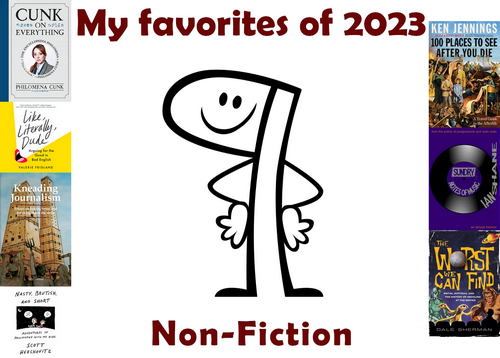
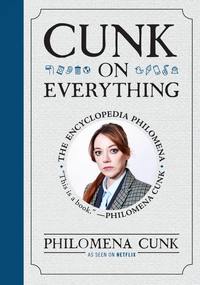 Cunk on Everything: The Encyclopedia Philomena
Cunk on Everything: The Encyclopedia Philomena
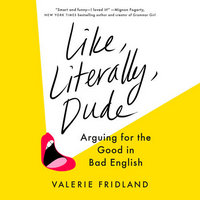 Like, Literally, Dude: Arguing for the Good in Bad English
Like, Literally, Dude: Arguing for the Good in Bad English
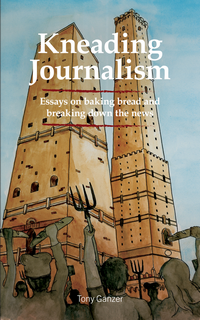 Kneading Journalism: Essays on baking bread and breaking down the news
Kneading Journalism: Essays on baking bread and breaking down the news
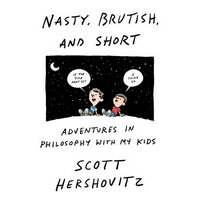 Nasty, Brutish, and Short: Adventures in Philosophy with My Kids
Nasty, Brutish, and Short: Adventures in Philosophy with My Kids
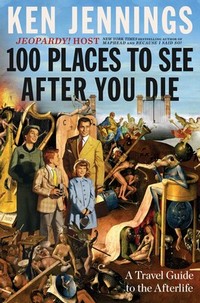 100 Places to See After You Die: A Travel Guide to the Afterlife
100 Places to See After You Die: A Travel Guide to the Afterlife
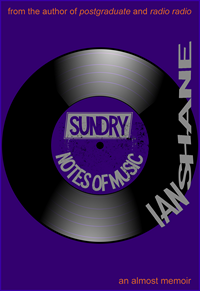 Sundry Notes of Music: an Almost Memoir
Sundry Notes of Music: an Almost Memoir
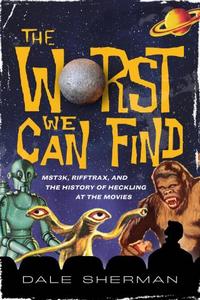 The Worst We Can Find: MST3K, RiffTrax, and the History of Heckling at the Movies
The Worst We Can Find: MST3K, RiffTrax, and the History of Heckling at the Movies
![]()





